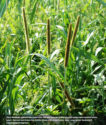Advertise Follow Us
Articles Tagged with ''North Dakota''
Farmer Panel: Cover Crops Help Store, Rather Than Steal Plains Soil Moisture
While covers may use some water, experienced no-tillers say they build water-holding capacity in no-tilled soils, soften the impact of rain and reduce soil moisture evaporation.
Read More




.png?height=125&t=1731942302&width=150)




